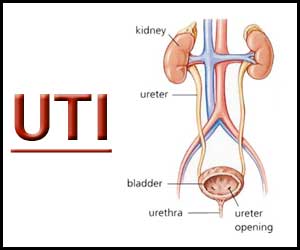- Home
- Editorial
- News
- Practice Guidelines
- Anesthesiology Guidelines
- Cancer Guidelines
- Cardiac Sciences Guidelines
- Critical Care Guidelines
- Dentistry Guidelines
- Dermatology Guidelines
- Diabetes and Endo Guidelines
- Diagnostics Guidelines
- ENT Guidelines
- Featured Practice Guidelines
- Gastroenterology Guidelines
- Geriatrics Guidelines
- Medicine Guidelines
- Nephrology Guidelines
- Neurosciences Guidelines
- Obs and Gynae Guidelines
- Ophthalmology Guidelines
- Orthopaedics Guidelines
- Paediatrics Guidelines
- Psychiatry Guidelines
- Pulmonology Guidelines
- Radiology Guidelines
- Surgery Guidelines
- Urology Guidelines
Short term antibiotics equally effective for bacteremic UTIs in infants

USA: Short term course of parenteral antibiotics gives similar outcomes as compared to long-term in infants with bacteremic urinary tract infections (UTIs), finds a recent study.
According to the study, published in the AAP journal Pediatrics, young infants with bacteremic UTI who received ≤7 days of parenteral antibiotics did not have more frequent recurrent UTIs or hospital reutilization compared with infants who received long-course therapy.
Short-term parenteral antibiotic therapy is shown to be safe and equally effective in uncomplicated urinary tract infections (UTIs), short-term therapy safety in bacteremic UTI had not been established. Due to this infant with bacteremic UTI receive prolonged courses of parenteral antibiotics leading to increased costs and long hospitalization.
Sanyukta Desai, the University of Cincinnati and Cincinnati Children’s Hospital, and colleagues determined the association between parenteral antibiotic duration and outcomes in infants ≤60 days old with bacteremic urinary tract infection (UTI) in this multicenter, retrospective cohort study.
The researchers analyzed 115 infants aged 60 days or younger who were admitted to a group of 11 participating EDs between July 1, 2011, and June 30, 2016, if they had a UTI caused by a bacterial pathogen. Half of them were given parenteral antibiotics for 7 days or less before being switched to oral antibiotics, and the rest were given parenteral antibiotics for more than 7 days before switching to oral. Infants were more likely to receive long-term parenteral treatment if they were ill-appearing and had growth of a non–Escherichia coli organism.
"This study uniquely affords granularity with respect to the patient population, including a physician’s documented clinical assessment providing information such as temperature, ill appearance, or presence of a known genitourinary condition, which allowed for ascertainment of critical clinical information that influenced management decisions," Natalia V. Leva, MD, and Hillary L. Copp, the University of California, San Francisco, wrote in an accompanying editorial.
“Researchers in future prospective studies should seek to establish the bioavailability and optimal dosing of oral antibiotics in young infants and assess if there are particular subpopulations of infants with bacteremic UTI who may benefit from longer courses of parenteral antibiotic therapy," concluded the authors.
The bottom line of the study is -- Short-course parenteral therapy with early conversion to oral antibiotics may be considered in infants with bacteremic UTI.

Disclaimer: This site is primarily intended for healthcare professionals. Any content/information on this website does not replace the advice of medical and/or health professionals and should not be construed as medical/diagnostic advice/endorsement or prescription. Use of this site is subject to our terms of use, privacy policy, advertisement policy. © 2020 Minerva Medical Treatment Pvt Ltd